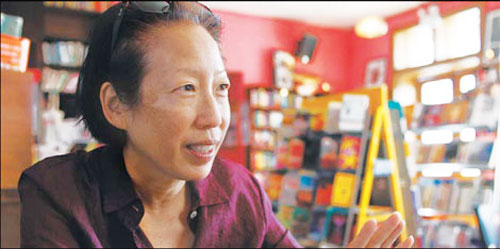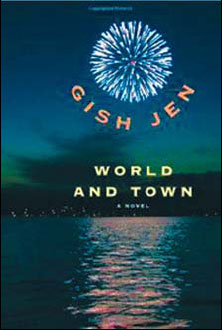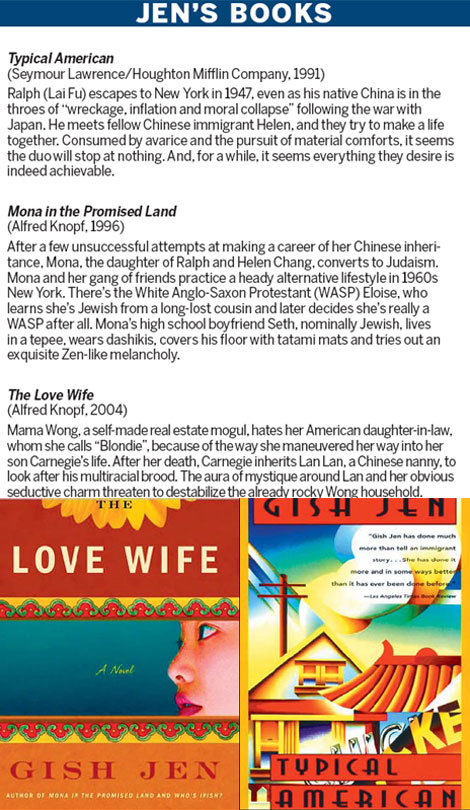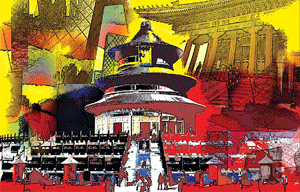Bearing the torch
Updated: 2011-11-04 11:06
By Chitralekha Basu (China Daily)
|
|||||||||
 |
|
Award-winning author Gish Jen says her next book will be about China. [Feng Yongbin / China Daily] |
Gish Jen, born to immigrant Chinese parents, is giving US literary heavyweights a run for their money. Chitralekha Basu reports.
It's a bit of a surprise meeting Gish Jen. One doesn't quite expect the writer to be so diminutive, almost bird-like in her demeanor, flighty, emotional and cheerful - laughing and crying almost in the same breath as she talks. A little gravitas would not have been out of place, given that Jen - born in Long Island, New York, to immigrant Chinese parents in 1955 - is seen as one of the torchbearers of the great American novel. In her four novels and a short story collection, Jen has taken up the time-tested themes of migration, aspiration, globalization, and the rise of religious fundamentalism, viewed through the prism of a Chinese cultural inheritance. Recently, the heavyweight feminist critic Elaine Showalter described Jen in The Guardian as one who "writes about great public (American) themes without fanfare or pretension". Showalter also added a slightly provocative rider, saying Jen's "vision of a multicultural America goes well beyond the angry rants or despairing projections of Philip Roth, Don DeLillo, Cormac McCarthy or other finalists in the Great American Novel competition", pitting Jen against a mighty wall of the male giants of US literature.
Jen, however, insists that she is not in the race. The recognition that has come her way in a 20-year writing career - her short fiction Birthmates was picked as among The Best American Short Stories of the Century by John Updike, for instance - was not her goal. She does acknowledge, however, that the awards, grants and having some of her books taught in university programs have been useful in so far as they "allow me to continue in my present status - to live this (writer's) life".
 |
Her last book, World and Town (Alfred Knopf, 2010), tackles complicated and sensitive themes, such as the state of Asian asylum-seekers in the United States, Christian fundamentalism in its most militant manifestation, transnational smuggling, the conflicts between Eastern and Western core values, superstition and reason, mechanization and environmental concerns.
It's also a rather regular story, about people unlikely to stand out in a crowd. Hattie Kong, Jen's 68-year-old protagonist, has just lost both her husband and best friend to cancer. Even as she is overwhelmed by grief - and, in fact, by an irrational sense of betrayal that the two people closest to her should leave her as if it were a pact - Kong is starting all over again, reaching out to her Cambodian neighbors, an immigrant family whose two adolescent children are trying hard to avoid being sent to correctional homes.
"It's a very Chinese theme," points out Jen, referring to the Chinese notion that an apparent tragedy might engender just the opposite.
"For Kong, the shattering of life offers an opportunity, allows her to put her life back together again in an integrated way."
Thus, Kong goes around Riverlake, a sparsely populated New England town, spread out over undulating hills and vales, playing Good Samaritan to the man whose wife threw him out of the property he helped build; the boy who is getting sucked into a smugglers' gang; and the girl who colludes with believers in militant Christian fundamentalism.
Militant Christianity leads to arson, violence and ultimately a death in the book - a drama played out against the backdrop of jihadi Islamic fundamentalism that brought down the World Trade Center towers in New York on Sept 11, 2001. It happens simultaneously, on a much larger and more visible canvas.
Ron Charles, who reviewed World and Town in The Washington Post, found Jen's treatment of the born-again Christian fundamentalist Ginny's character "fundamentally condescending".
"It's the natural liberal response," says Jen, referring to the criticism. "One shouldn't be tolerating groups, holders of particular beliefs who trump the legal system or the constitution. I am not too taken by starry-eyed liberalism saying we can embrace all of them. At the same time, it's unfair to say I demonized fundamentalists. I have talked to a lot of them."
Indeed, while the plot of World and Town was completely made up, a lot of effort went into getting the details right, Jen says. She sat in a school and ran her tape recorder to pick up youth slang, and she sat in a church in the south of Boston to follow the tone and tenor of a service in progress. She even talked to a few former gang members about the nitty-gritty of smuggling bear gall bladders (thought to be of medicinal value) to Canada and - to her utter bewilderment - was told "the strategies of smuggling I had thought of were close to the way they actually did it".
While her first book, Typical American published in 1991, was about two materially driven immigrant Chinese, struggling to fit into the American milieu - almost like swallowing a bitter pill - in World and Town, the protagonist, now quite entrenched in her American-ness, tries to get in touch with her other side - her Chinese-Asian facet.
Hattie Kong, a rational, retired biology teacher, ultimately gives in to her Hong Kong-based niece's entreaties to move her parents' remains from the US to the family burial ground of the Kongs - a clan supposedly descended from the great Chinese philosopher Confucius (551-479 BC) in Qufu - humoring her belief, though not necessarily subscribing to it herself, that such an act would cancel the negativity plaguing the family.
"World and Town is also about recovery," Jen says. "It's very much about how we put ourselves back together again, how we can make the shattered vase whole. It's about starting over."
Her next book, she says, will be about China. Jen, who majored in English of Harvard and has an MFA in writing from the Iowa Writers' Workshop, has been visiting China since 1979. She has taught at the Shandong Coal Mining Institute, Beijing Normal University and Hong Kong University.
"I have a long-standing interest in China," she says. And this time around, her theme is going to be happiness.
The source of her personal happiness, however, is all too obvious. Talking about her children, Luke, 20, and Paloma, 12, brings a glint to her eye. Motherhood has informed her writing - probably more than being born a woman or "being born in New York and having an imaginary sense of China", she insists.
"Literature is not as important as children," she says.
"Being a woman and a mother has added to my understanding in a deep way. It has made me a compassionate person. When women protest against wars, I understand what that means."












